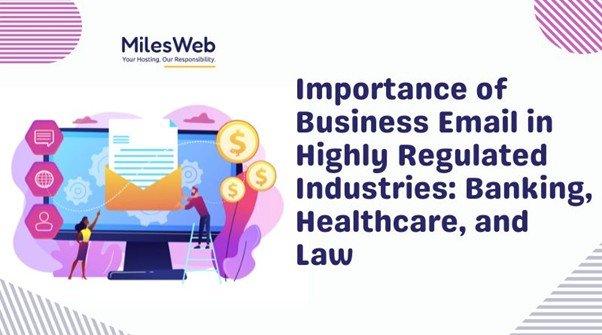Banking, healthcare, and law are crucial sectors dealing with sensitive information. Any breach could cost millions. Therefore, they are highly regulated industriesand startups. For communication, they use email for startups services. Besides regulation, compliance also plays a pivotal role in setting up these industries. Setting up a secured email infrastructure ensures all sensitive information is protected within one area.
A professional email address and secure business email system. It is essential for data integrity, maintaining client trust, and meeting strict industry regulations. Let’s understand why regulated industries can’t afford to ignore this.
Problem: Email Risks Go Beyond Spam and Hacking
Basic email systems can be a security nightmare for several businesses. They may work for everyday chores, but handling sensitive client records is riskier. Financial data, legal documents, or patient records must be protected with the right email hosting infrastructure.
One unsecured email can result in data breaches, privacy violations, and regulatory penalties. These risks don’t just cost money; they permanently damage reputations.
Compliance Pressure and Client Trust
The above-mentioned sectors operate under heavy cybersecurity and scrutiny. Regulatory bodies enforce stringent data protection regulations like HIPAA, GDPR, and PCI DSS. Non-compliance can lead to huge fines or license cancellation.
Clients expect total confidentiality. Customer trust is broken if industries fail to shield information. It erases the years of credibility and brand reputation.
Safeguarding Financial Integrity
RBI intensively monitors the financial data of banks and NBFCs (Non-Banking Financial Companies). Banks process and handle volumes of financial data regularly. A secured business email maintains the integrity between internal and external communication with strong encryption. Even all of their professional emails are hosted on SSL-encrypted domains.
It prohibits phishing attacks and targets customer accounts to help meet regulatory standards like RBI and PCI DSS. With verified domains, customers also recognize authentic communication instantly.
Protecting Patient Confidentiality
Healthcare sectors cannot compromise on patient data privacy. Business emails complying with HIPAA (Health Insurance Portability and Accountability Act) encryption standards secure health records, prescriptions, and test results.
Secure servers prevent data leaks and maintain doctor-patient confidentiality. The fact that their information is safe and respected also builds patient confidence.
Maintaining Legal Confidentiality
Law firms can use business domain emails, ensuring all legal records, transcripts, hearings, and the verdict are secured. These are highly sensitive legal contracts that should remain private and protected.
Upholding the judicial records supports their accountability. It helps them give an unbiased verdict in the court proceedings. Clients are far more comfortable engaging with firms that use verified, secure communication channels.
Centralized Control and Monitoring
Organizations get the centralized control over data sharing and its storage. IT admins in banking, healthcare, and law enable the permission settings that restrict accessibility to limited users.
Data leaks and insider misuse can be prevented through this level of oversight. It’s a safety net that’s unmatched by standard email providers.
Reputation and Client Confidence
Secure business emails enhance the brand credibility. Institutions communicating with emails like @yourlawfirm.com or @healthfirst.in show their legitimacy. Instead of free domains or Gmail IDs, these mail addresses signal professionalism.
Such professionalism highlights responsibility and care, values that matter deeply in trust-based industries. It turns security into a brand advantage, not just a requirement.
Wrap Up
In a field of trust and compliance, a professional business email is not merely an organizational communications tool; it serves as a protective shield. Business email shields and protects clients, ensures compliance, and provides confidence in the integrity of an organization.
Whether it is a bank protecting accounts, a hospital protecting patient documentation, or a law firm protecting confidentiality, secure professional business emails are the backbone of trusted communications for an organization. In the regulatory world, trust is built by how the email is produced, composed, and sent.
